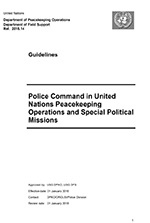
The Guidelines include principles for any UN police commander tasked to lead officers from different countries with very different policing styles and provide guidance for the unique challenges this operating environment presents in the context of collaborating with the host-State police service and other elements of the operation.
To develop the guidelines, almost 100 experts from Member States, think tanks and partner organizations including the African Union, joined current and former UN police commissioners in Pretoria, South Africa in October 2014 to discuss various aspects of police command. The workshop was organised by the United Nations together with the Institute for Security Studies in Pretoria, the Swedish National Police and the support of the Swedish Ministry of Foreign Affairs.
The guidelines complement the existing DPKO-DFS Policy on Authority, Command and Control in United Nations Peacekeeping Operations (2008) with more detail for police commanders. They address managing human resources; capacity-building for transferring policing and law enforcement responsibilities to the host-State police; the zero-tolerance policy to sexual exploitation and abuse; human rights protection and employing intelligence-led policing strategies. The guidelines also include approaches on working with community members, including women, as full partners in policing activities; and facilitating the full participation of women and girls in decision-making, planning, implementation and oversight.
The aim of the Guidelines is to outline specific roles and responsibilities of United Nations police components – from the tactical-level police officer to the Police Commissioner – so each can conduct their work more effectively.
